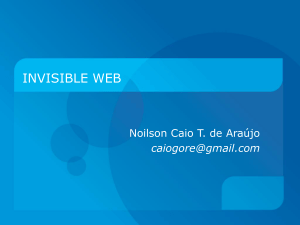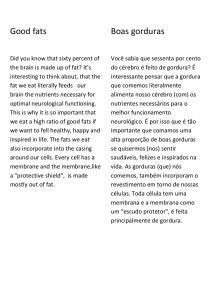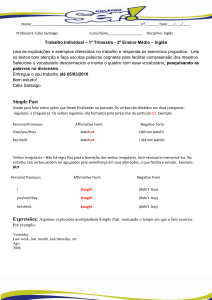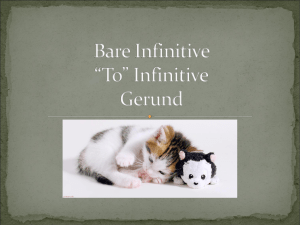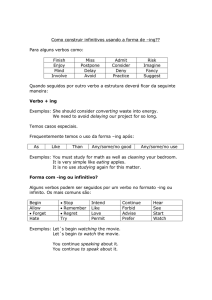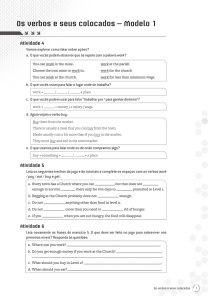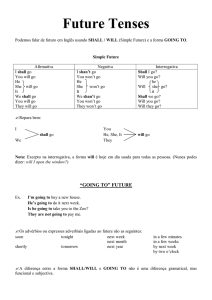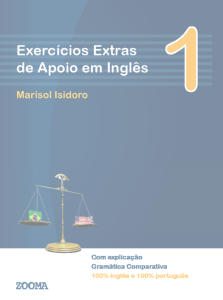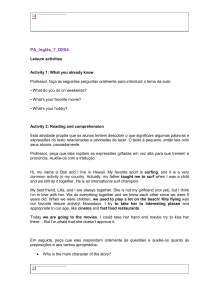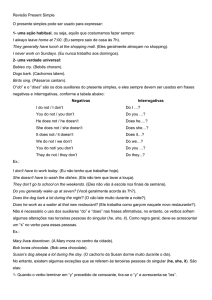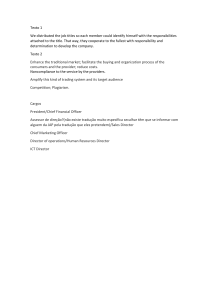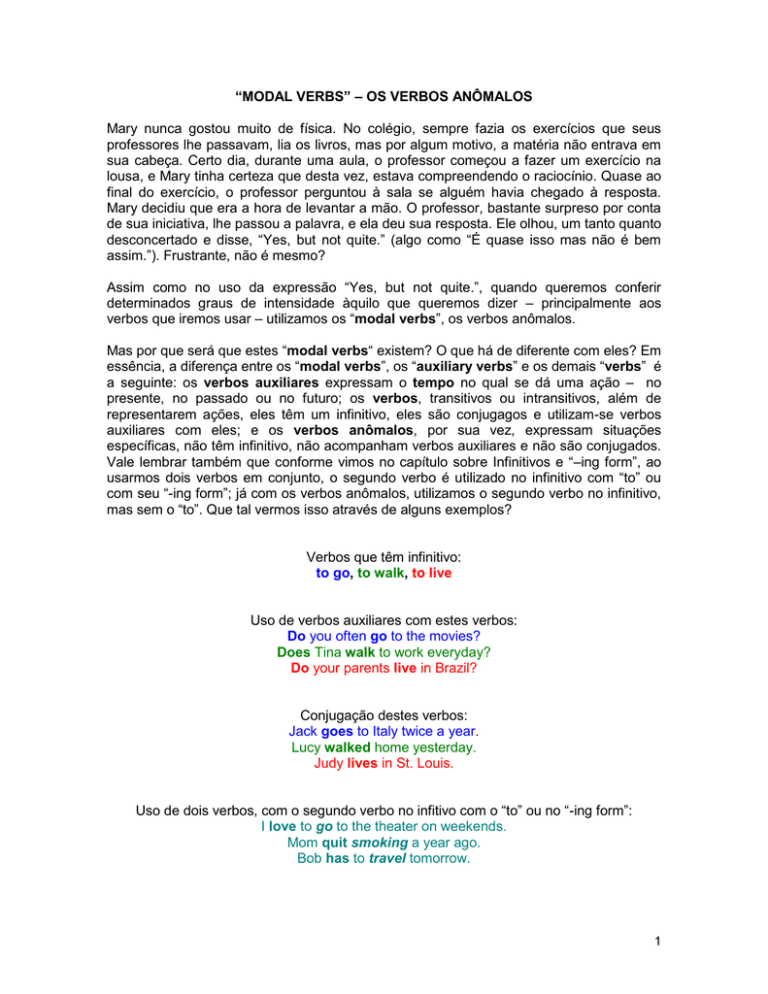
“MODAL VERBS” – OS VERBOS ANÔMALOS
Mary nunca gostou muito de física. No colégio, sempre fazia os exercícios que seus
professores lhe passavam, lia os livros, mas por algum motivo, a matéria não entrava em
sua cabeça. Certo dia, durante uma aula, o professor começou a fazer um exercício na
lousa, e Mary tinha certeza que desta vez, estava compreendendo o raciocínio. Quase ao
final do exercício, o professor perguntou à sala se alguém havia chegado à resposta.
Mary decidiu que era a hora de levantar a mão. O professor, bastante surpreso por conta
de sua iniciativa, lhe passou a palavra, e ela deu sua resposta. Ele olhou, um tanto quanto
desconcertado e disse, “Yes, but not quite.” (algo como “É quase isso mas não é bem
assim.”). Frustrante, não é mesmo?
Assim como no uso da expressão “Yes, but not quite.”, quando queremos conferir
determinados graus de intensidade àquilo que queremos dizer – principalmente aos
verbos que iremos usar – utilizamos os “modal verbs”, os verbos anômalos.
Mas por que será que estes “modal verbs“ existem? O que há de diferente com eles? Em
essência, a diferença entre os “modal verbs”, os “auxiliary verbs” e os demais “verbs” é
a seguinte: os verbos auxiliares expressam o tempo no qual se dá uma ação – no
presente, no passado ou no futuro; os verbos, transitivos ou intransitivos, além de
representarem ações, eles têm um infinitivo, eles são conjugagos e utilizam-se verbos
auxiliares com eles; e os verbos anômalos, por sua vez, expressam situações
específicas, não têm infinitivo, não acompanham verbos auxiliares e não são conjugados.
Vale lembrar também que conforme vimos no capítulo sobre Infinitivos e “–ing form”, ao
usarmos dois verbos em conjunto, o segundo verbo é utilizado no infinitivo com “to” ou
com seu “-ing form”; já com os verbos anômalos, utilizamos o segundo verbo no infinitivo,
mas sem o “to”. Que tal vermos isso através de alguns exemplos?
Verbos que têm infinitivo:
to go, to walk, to live
Uso de verbos auxiliares com estes verbos:
Do you often go to the movies?
Does Tina walk to work everyday?
Do your parents live in Brazil?
Conjugação destes verbos:
Jack goes to Italy twice a year.
Lucy walked home yesterday.
Judy lives in St. Louis.
Uso de dois verbos, com o segundo verbo no infitivo com o “to” ou no “-ing form”:
I love to go to the theater on weekends.
Mom quit smoking a year ago.
Bob has to travel tomorrow.
1
Verbos anômalos não têm infinitvo:
can, may, would
(NÃO existe to can, to may, to would)
Verbos anômalos não são utilizados com verbos auxiliares e que não usam “to” antes do
segundo verbo no infinitivo:
Tim can’t play soccer.
(NÃO Tim don’t can’t play soccer.)
May Carrie go to Lynette’s house?
(NÃO Do Carrie may go to Lynette’s house?)
Would you like some chocolate?
(NÃO Do you would like some chocolate?)
Agora que já vimos algumas das características dos verbos anômalos, que tal olharmos
cada um deles com mais calma?
Can, could, be able to
Mario resolveu tirar um cochilo e no meio do caminho, começou a pensar sobre seu dia.
Será que ele vai conseguir passar na prova? Ele estudou bastante e gosta de
matemática, ele consegue fazer os exercícios com facilidade... Será que alguém irá ajudálo em seus projetos? Mario está pensando sobre as possibilidades, as probabilidades e
sobre a sua capacidade ou habilidade de fazer as coisas.
Quando queremos dizer que alguém tem – ou não – a capacidade de fazer alguma coisa,
usamos em inglês os verbo anômalos “can/cannot” para o presente, e “could/couldn’t”
para o passado. Vejamos isso no caso de Mario:
Mario can easily solve Math problems.
Neste exemplo, podemos ver que Mario é capaz de solucionar questões matemáticas
com facilidade. E seus projetos, como ficam?
Can’t Susan help Mario with his projects?
Susan could help Mario.
Será que a Susan – amiga de Mario – poderá lhe dar uma mão em seus projetos? Vemos,
neste caso, a possibilidade ou a probabilidade disto acontecer.
Podemos usar can também para fazer pedidos (“requests”) ou pedir autorização
(“permission”) para alguma coisa, em uma situação informal:
2
Susan, can’t you help Mario with his projects?
Can I use your computer for a moment?
Quando queremos, em contrapartida, fazer estes mesmos pedidos ou autorizações em
situações formais, utilizamos could. Ao tratarmos de habilidades que se tinham no
passado, também utilizamos este modal verb:
Could you please help me?
Pelé could play soccer very well.
Nem tudo que planejamos acontece na vida... quando queremos tratar destas situações,
sobre uma possibilidade que não aconteceu (“past possibility that didn’t happen”),
utilizamos could have + past participle:
I could have been a rock star.
Lucas could have been a great teacher.
I could have been a great scientist, but no one believed in my inventions.
Além de can e could, podemos usar be able to para tratar das habilidades de alguém ou
de alguma coisa. Quando se trata de uma habilidade em geral, normalmente prefere-se o
uso do can ou could; enquanto que em relação a habilidades específicas, ou que
aconteceram em momentos específicos, utiliza-se be able to:
Christina can’t ride a bike. (Christina still can’t ride a bike.)
When Christina was young, she wasn’t able to ride a bike. (In the past she couldn’t, now
she can.)
Diferentemente de can e could que só podem ser usados no presente e no passado,
podemos usar be able to para descrever as possibilidades futuras:
I will be able to visit my grandmother next week .
Tom won’t be able to pick me up tomorrow because his car is broken.
Por fim, quando queremos falar de habilidades e é necessário usar outros verbos, seja no
“to-infinitive”, “-ing form”, nos “perfect tenses” ou com outros “modal verbs”, também
utilizamos be able to:
Kelly doesn’t seem to be able to find anything in this mess!
Julie said they might have been able to finish their work today.
The teacher wouldn’t listen, and we weren’t even being able to speak our minds.
Don’t have to, have [got] to
Imagine se um belo dia alguém chegasse para você e dissesse que, à partir daquele
momento, você não teria que fazer nada além daquilo que realmente quisesse fazer...
You don’t have to do anything anymore! You don’t have to work, you don’t have to
study, you don’t have to pay any more bills and you have to do EVERYTHING that you
want to!
3
Quando queremos tratar de coisas que não era necessário fazer (“unnecessary things”),
utilizamos don’t have to. Seria ótimo não ter mais que pagar contas, nem trabalhar, nem
estudar por obrigação e ter que fazer tudo aquilo que gostamos! Pois quando queremos
falar de obrigações, deveres (“duties, obligations”), podemos utilizar o “modal verb”
have to.
O mesmo vale para o passado – didn’t have to – quando achamos que alguma coisa no
passado não era necessária, e esta coisa não aconteceu. Jill quis ser gentil com a mãe
de seu namorado na primeira vez em que foi jantar em sua casa e decidiu comprar-lhe um
buquê de flores. Ligou para seu namorado antes para perguntar o que ele achava, e ele
disse que sua mãe era alérgica a flores. A mãe de Jill, no entanto, ficou muito brava
quando soube que sua filha não fez nenhum agrado à futura sogra. Jill lhe disse:
Mom, I didn’t have to bring her flowers because she’s allergic to them!
Mesmo assim, a mãe de Jill não ficou muito contente... Vale lembrar que tanto “have to”
quanto “didn’t have to” podem ser utilizados no futuro.
Digamos que da próxima vez em que Jill for à casa de sua sogra, sua mãe lhe diga:
You have [got] to buy her a small gift this time!
Quando queremos descrever algo que alguém nos sugere – de maneira enfática – fazer,
ou que nos obriga fazer, usamos have [got] to. A mãe de Jill realmente não desiste.
Had better
Sabe quando você está prestes a sair de casa, atrasado e com pressa, e sua mãe ou
alguém de sua família pára na sua frente e diz, “Vai esfriar. É melhor você levar um
casaco...”? Pois então – quando queremos falar sobre algo que consideramos sensato ou
recomendável (“to give advice or to suggest something sensible”), podemos usar o
verbo anômalo had better, desde que seja para situações específicas e não para
abordar o passado em geral:
If it’s cold, you had better take a coat with you.
You’d better listen to what I say, young man!
May, might
Desde o dia em que começou a frequentar o colégio, Andrew ficou bastante interessado
4
em Millie. Um belo dia tomou coragem para convidá-la para ir ao cinema. Millie,
entretanto, respondeu:
I don’ t know... I might go shopping with my friends tonight.
Andrew não desistiu, e resolveu convida-la na semana seguinte. Entre a aula de
matemática e a de português, aproximou-se dela e deu início à conversa novamente.
E Millie...
Actually, Andrew, I think I may have a flu so I might go home and rest.
Andrew ficou meio envergonhado, mas decidiu mesmo assim convida-la na semana
seguinte. E lá foi Andrew, no intervalo das aulas, abordar Millie mais uma vez. E mais um
não. Andrew finalmente ficou irritado e lhe perguntou:
May I ask you why won’t you go out with me?!
Millie, indignada com a reação de Andrew respondeu:
Yes, you may! It’ s because I may not like you!
Pois é… pobre Andrew. Quando queremos tratar da possibilidade das coisas
acontecerem, seja a possibilidade no presente ou no futuro, ou mesmo das possibilidade
das coisas serem verdade, podemos usar may e might. A diferença entre os dois verbos
anômalos é muito pequena – quando usamos might, normalmente é para indicar que a
possibilidade das coisas acontecerem ou delas serem verdade é menor. Assim, desde o
início as chances de Andrew conseguir sair com Millie eram um tanto quanto remotas...
Ao contrário de “could”, não costuma-se usar “may” para perguntar sobre a possibilidade
das coisas acontecerem; já “might” pode ser usado, apesar de assumir neste caso uma
acepção mais formal. Quando usamos uma pergunta com “may” or “might”, normalmente
é para dar um tom mais formal ou educado (“polite request or request”) ao que
queremos saber. No caso de Andrew, ele tentou ser gentil em sua maneira de perguntar à
Millie sobre os motivos das suas respostas sempre negativas – afinal de contas, já que
ela criava desculpas para tudo, pelo menos aquilo ela poderia responder. Contudo, Millie
achou-o abusivo...
Se quisermos tratar das coisas que podem ter acontecido no passado, podemos usar
may/might + have + past participle. Vejamos o exemplo a seguir:
Tony can’t find his pen. He might have forgotten it at home.
Neste caso, como Tony não está encontrando sua caneta, é possível que ele a tenha
esquecido em casa. Há também mais um uso para might (apenas) no passado – para
descrever ações que aconteceram tipicamente no passado:
Tim was so in love with Lilly, that he might send her a bouquet of flowers everyday.
Quando queremos tratar destas situações, utilizamos might + infinitive.
5
Podemos usar may/might + have + past participle também para descrever alguma coisa
que pode acontecer até um determinado momento no futuro:
By the next time Andrew asks Millie out, she might have accepted.
Será que Millie irá finalmente ceder aos pedidos de André? Quem sabe ele não a vence
pelo cansaço...
Ademais, may/might + have + past participle pode ser usado também para falar daquilo
que poderia ter acontecido se as circunstâncias ou condições no passado tivessem sido
diferentes (vide capítulo sobre as condicionais):
If Andrew hadn’t asked Millie out so many times, she may have accepted his invitation.
Por fim, quando queremos tratar de possibilidades presentes, ou de algo que poderá ser
combinado para o futuro, podemos usar may/might + be + verbing:
Chris might be having lunch at her grandmother’s house. She usually goes there on
Tuesdays.
Must
Quando queremos enfatizar a necessidade de se fazer alguma coisa no presente ou no
futuro, usamos o verbo anômalo must (podemos também usar will have to ao tratar de
necessidades futuras):
You must pack your bags tonight. We won’t wait for you tomorrow.
Ao menos que a pessoa não se incomode em perder a viagem, é bom que ela faça sua
mala logo...
I must/will have to go to the dentist tomorrow. My tooth is really hurting.
Da mesma forma, é melhor que a pessoa trate de seu dente o quanto antes, e pelo jeito,
ela marcou uma consulta no dentista.
Ao estudarmos o uso do “have got to”, vimos que pode se tratar de uma situação na qual
alguém ou alguma coisa impôs ou exigiu uma obrigação, estabeleceu uma necessidade
sobre alguma outra coisa ou pessoa. Normalmente, quando usamos “must”, apesar de
também se tratar de uma necessidade, o verbo anômalo diz respeito aquilo que foi
estabelecido como necessidade pelo sujeito da oração, e não por uma “força externa”:
I have [got] to talk to my mother.
(The mother probably required/asked for this conversation.)
X
I must talk to my mother.
(The person has decided she/he needs to talk to his/her mother.)
6
Podemos usar “must” também para descrever conclusões lógicas. Voltemos ao exemplo
da pessoa que estava com dor de dente:
His tooth was really hurting last night. He must have gone to the dentist.
Como se sabia que a pessoa estava com dor, chega-se à conclusão lógica de que ela foi
ao dentista. É possível também usar “must” em conclusões lógicas de natureza irônica:
Luke is going to get married?! He must be crazy! He has only known Julie for one month!
Luke parece estar apaixonado… já o seu amigo acha que ele está louco por ter decidido
se casar com alguém que só conhece há um mês...
Vale lembrar que “must” só pode ser usado no presente – quando queremos falar de algo
que foi necessário no passado, ou que será necessário no futuro, usamos had to e will
have to. Entretanto, se quisermos concluir algo a respeito do passado, podemos usar
must + have + past participle:
Joan must have been really upset with her test results. She studied very hard.
Finalmente, se quisermos dizer que algo é proibido, usamos mustn’t (must not):
Children mustn’t be left home alone.
Talvez o filme “Esqueceram de Mim” esclareça bastante a este respeito!
Need
O uso de need é bastante curioso, pois ele pode funcionar tanto como um verbo “normal”
quanto como um verbo anômalo. Para que need seja um verbo anômalo, ele deve ser
sempre preceder um verbo no infinitivo. Ademais, é mais comum encontra-lo em sua
forma negativa ou em algumas perguntas:
You needn’t yell. I can hear you perfectly well.
Need aparece normalmente como a necessidade de se fazer – ou não – alguma coisa. No
exemplo acima, não era necessário gritar pois a outra pessoa estava ouvindo
perfeitamente bem. Podemos também usar don’t need to nestes casos, inclusive para o
passado:
You didn’t need to bring all your textbooks!
Por fim, podemos usar need + not + have para falar daquilo que foi feito no passado, mas
que não precisava necessariamente ter sido feito:
I needn’t have brought all of my textbooks. The teacher used only one of them.
7
Should, ought to, shall
“Should”, “ought to” e “shall” são intercambiáveis, com algumas ressalvas. Eles são
utilizados para dar conselhos (“advice”), fazer recomendações (“suggestions,
recommendations”), perguntar coisas de maneira gentil (“polite request”), falar sobre
responsabilidades e sobre a probabilidade das coisas. Vejamos alguns exemplos:
I think it’s going to rain. You should take a coat.
Neste caso, poderíamos também ter colocado “ought to” para dar este conselho à pessoa.
Em contrapartida, “shall” normalmente é utilizado em situações mais formais. Vale lembrar
que não se usa “ought to” para recomendar algo na primeira pessoa do singular (“I”).
There is always traffic on New Orleans Street. You should take New York Avenue.
Quando queremos fazer uma recomendação ou dar uma sugestão a alguém, podemos
usar tanto “should” quanto “ought to”, assim como se quisermos falar sobre as
responsabilidades ou obrigações de alguém:
Bruna ought to take her dog for a walk!
Ao fazermos perguntas ou sugestões de maneira gentil ou mais formal, podemos usar o
verbo anômalo “shall”:
Shall I leave your books here?
Shall we go?
Em ambos os casos, poderíamos ter usado “should”.
“Should” e “ought to” também são utilizados para descrever possibilidades ou verdades
presentes ou que irão acontecer até um momento no futuro. Vejamos alguns exemplos:
“Do you have some paper?” “ There ought to be some in my folder.”
Assim, é possível que haja papel na pasta desta pessoa.
We should have received grandma’s letter by next Friday.
Neste caso, faz-se uma previsão acerca de uma possibilidade futura.
Para tratarmos de obrigações no passado que possivelmente não foram seguidas ou
respeitadas, podemos usar should + have + past participle, assim como para tratar de
expectativas presentes, passadas ou futuras:
Margaret should have paid her debts! I can’t believe she has spent all her money on
clothes!
My mother should have arrived by now.
8
Enfim, quando queremos oferecer alguma coisa, ou quando queremos confirmar aquilo
que estamos fazendo ou pensando, também podemos usar shall ou should:
Should I tell Mr. Jones that you called, Mrs. Jones?
Be allowed to
Quando nosso intuito é dizer que alguém tem permissão, em geral, para fazer as coisas,
utilizamos be allowed to:
Now that Danny is 18, he is allowed to drive my car.
Podemos usar be allowed to também para descrever permissões dadas ou concessões
feitas no passado, assim como a não existência dela:
Brenda wasn’t allowed to go out at night with her friends.
Quem sabe quando Brenda ficar mais velha, seus pais lhe deixarão sair à noite com seus
amigos...
Por fim, sempre que formos usar o Infinitive, o Present Perfect ou o Past Perfect para
tratar da possibilidade – da permissão – de fazer alguma coisa, é necessário utilizar “be
supposed to”, e NÃO can/could:
James isn’t allowed to party at that disco because he picked a fight there with someone
last week.
Students over 18 have been allowed to drink at their graduation party.
I had been allowed to visit that sector of the museum because I am a researcher.
Be supposed to
Costuma-se utilizar be supposed to quando temos a obrigação de fazer alguma coisa.:
I am supposed to be at school by 7:30 a.m.
Normalmente, a conotação de obrigatoriedade em “be supposed to” é um pouco mais
“leve” do que quando usamos “should” ou “ought to”:
You should be ready for the game now.
X
You are supposed to be ready for the game now.
Além disso, podemos usar “be supposed to” para descrever coisas que sejam de
conhecimento geral ou que são tidas como verdades:
9
Exercising is supposed to be good for your heart.
Will, would
E chegamos aos nossos últimos verbos anômalos, will e would. “Last, but not least”,
como dizem em inglês (algo como os últimos, mas não por isso menos importantes).
Usamos will e will not (won’t) para tratar da disposição (“willingness”) – ou não – de
se fazer alguma coisa:
The teacher will give me the chance of taking another test.
Neste exemplo, a professora se mostrou disposta a dar mais uma chance ao aluno,
através de uma outra prova. Vejamos um exemplo na negativa:
Lorrie won’t travel by plane. She is afraid of flying.
Por conta de seu medo de voar, Lorrie se recusa – ou não está disposta a – viajar de
avião. Ademais, podemos usar will/won’t também para tratar de coisas que não estão
funcionando corretamente – como se as coisas estivessem deliberadamente contra nós
(por acaso você já pensou isso sobre o computador que costuma usar?)!:
I can’t believe it! For some reason, my mobile phone won’t turn on!
Sabemos que would é o passado de will, mas, será que ele pode ser usado no mesmo
sentido? De fato, podemos usar would para falar sobre a disposição de fazer alguma
coisa no passado de uma maneira geral, mas jamais para situações específicas:
Gabrielle would always help washing the dishes.
Entretanto, com a negativa, wouldn’t, podemos falar tanto de situações em geral quanto
de situações específicas:
I thought I wouldn’t pass the exam. (specific situation)
I wouldn’t help washing the dishes at home. It’s too boring! (general situation)
Ademais, quando queremos afirmar a certeza sobre uma determinada situação no
passado ou no futuro, também podemos usar “will” e “won’t”:
I won’t go to school tomorrow.
Bobby will arrive late tonight.
Peter conheceu Sandra em uma festa e pegou seu telefone. Quis convida-la
ligou para ela, mas como ela não atendeu, Peter deixou um recado em sua
eletrônica. Sandra, que não estava muito interessada em Peter, não ligou de
que Peter decidiu ligar novamente e neste dia, Sandra estava em casa.
perguntou porque ela não havia retornado sua ligação, e Sandra disse,
para sair;
secretária
volta. Até
Peter lhe
I would have called, but I lost your number.
Quando queremos tratar de situações imaginárias, que não aconteceram no passado
10
(“unreal past situations”), utilizamos would + have + past participle. Até que Sandra
conseguiu inventar uma boa desculpa...
Além de usarmos will e would para falar da disposição de fazer as coisas, ou de
situações imaginárias no passado, também podemos usá-los para descrever hábitos e
coisas que costumávamos fazer no passado, ou que fazemos com frequência no presente
(mas não para coisas esporádicas):
I will listen to some music everytime I’m in my car.
I would always take my dog for a walk on that street. Now it’s too dangerous.
Por fim, quando queremos oferecer alguma coisa de maneira gentil, utilizamos would:
Would you like some water?
Para facilitar sua consulta aos “Modal Verbs”, fizemos a tabela a seguir:
Modal Verb Past Form Future Form
Use(s)
see could
can
--------------- - ability
could
had better
Example
- Can Joan play the
piano?
- informal permission - Can Lorrie use your
phone?
- informal request
- Can I borrow your
sharpener?
- Michael Jordan could
--------------- - past ability
play basketball very
well.
- polite permission
- Could you give me a
ride, please?
- polite request
- Could I leave early?
could have +
- possibility in the
- Judy could have been
past participle
past that didn’t
an excellent volleyball
happen
player. Too bad she
quit the team.
- You’d better stay
--------------- --------------- - like “should” or
“ought to”; to give
home if you’re not
advice
feeling well.
- to suggest
something sensible
(not to talk about the
past or to say
general things)
don’t have to didn’t have to --------------- - something is
unnecessary
- I’d better leave – it’s
almost 1 a.m.!
- Jack doesn’t have to
drive me home tonight.
11
have to (has
to)/ have got
to
had to
will have to
- something was
unnecessary in the
past and didn’t
happen in the past
- duty, obligation
- “external” obligtion
(someone or
something else
imposes something
as necessary)
- polite permission
may
- polite request
may + be
+verbing
may have +
past participle
might
--------------- --------------might + be +
verbing
might have + --------------past participle
might +
infinitive
---------------
- I didn’t have to cook
dinner because the
kids went out with their
dad.
- You have to leave.
Tim had to leave.
Lucy will have to leave.
- You have got to stop
your car when the
police tell you to.
- You may leave now.
- Mr. Smith, may I use
your bathroom?
- It may rain tomorrow.
- I may be moving to
Spain next year.
- strong possibility
- possibility of
something
happening now or in
the near future
- past possibility
- Sam went out with
Lucy yesterday, but I
think they might have
had a fight.
- possibility in the
- I might have
future
completed my
assignment by next
week.
- small possibility
- I might go to Susan’s
party.
- small possibility of - Jack won’t answer his
something
phone. He might be
happening now or in working right now.
the near future
- past possibility
- They might have
already left.
- small possibility in - He might have arrived
the future
by Tuesday.
- a typical situation
- During World War II in
that happened in the Poland, people might
past
be sent to
concentration camps
just because someone
thought they were
Jews.
12
must
--------------- - duty, obligation
- You must study.
- duty or obligation in - I must go to school
the future
tomorrow for I have a
test.
- logical conlcusion
- Joe bought a Ferrari?
He must be out of his
mind!
Sue must be sick for
she didn’t come to work
today.
- probability
- He must be tired.
must have + --------------- - logical conclusion
- He must have been
past participle
(about the past)
tired.
--------------- --------------- - not to be allowed to - You mustn’t step on
mustn't
the grass.
need/needn’t didn’t need to --------------- - something is
- You needn’t yell!
OR need not
unnecessary (need is You needn’t worry
a modal verb only
have to +
about the exam; it’s
past participle
before a bare
very easy!
infinitive; most
common in negative
sentences and in
questions)
- something is
unnecessary in the
past
ought to
shall
ought to OR
ought to have
+ past
participle
- something that
happened in the
past was
unnecessary
--------------- - advice
- obligation
- I didn’t need to go to
the market for Jean
was on her way over
there.
- I needn’t have bought
a gift for Claire. Luke
called and said he had
already bought one.
- You ought to eat less.
- Karen ought to finish
her homework.
- You ought to have
eaten less.
- advice about
something that
already happened in
the past
- Shall we dance?
--------------- --------------- - invitation
- offer
- Shall I give you a
ride?
- obligation (normally - The company shall
used in formal
pay its debt in no more
situations)
than two months.
13
should
should OR
--------------- - advice
should have +
past participle
- probability
- suggestion
- You should rest.
- I studied a lot for the
test so I should get a
good grade.
- You should buy that
dress, it looks nice on
you.
- Should I leave these
books over here?
- to request
confirmation or
advice
should have + --------------- - obligation in the
- You should have
past participle
past (normally with a finished your
negative conotation) homework already.
- advice about
- You should have
something that
rested more.
already happened in
the past
to be able to
was able to
- present, past or
future expectations
will be able to - general ability in the
present or in the past
(can is more
commonly used)
to be allowed was allowed
to
to
will be
allowed to
to be
supposed to
simple
present with
future
meaning
was
supposed to
- Thomas should have
arrived by now.
- Dan is able to swim.
Molly wasn’t able to
walk.
- specific
- Now that Tom is
achievement in the feeling better he is able
past or in the present to work again.
Wilma was able to read
that 500-page book in
only one day!
- with to-infinitive, -ing - It was great to be able
form, perfect tenses to work here for 20
or other modal verbs years!
I cant believe she was
able to stay away from
here baby for so long.
- future possibility
- I’ll be able to hand in
my paper next Friday.
- general permission - I wasn’t allowed to
in the past
arrive home after
midnight.
- obligation
- Jack is supposed to
arrive at 9 a.m.
I was supposed to
hand in the paper a
month ago.
14
will/won’t
see would
- general knowledge - Eating too much
chocolate is supposed
to be bad for your
stomach.
- My teacher will give
--------------- - willingness or
unwillingness to do me another chance to
something (in offers, take the test.
requests, orders or My mobile phone won’t
invitations; to refuse turn on for some
something, not want reason!
to do something or
Toby will go to Jane’s
when things don’t
party.
happen as they
Won’t you join us for a
should )
drink?
- present or future
uncertainty
- Will Jack and Jill ever
get married?
- habits
would
- Dogs will always
recognize their true
owners, no matter how
long they’ve been
apart.
--------------- - general williingness - Mom would drive me
in the past
to school everyday.
- general habits in the - Jim would always eat
past
a candybar after lunch.
- offers
- requests
would have + --------------- - imaginary past
past participle
situation
- Would you like a
glass of water?
- I would like some
orange juice, please.
- I would have called
you, but I lost your
number.
Veja, neste poema, o uso dos verbos anômalos:
(Un)Consciencious Modals
It should have been, but it wasn’t.
It might have worked, but it didn’t.
It could have been blessed, but it vanished.
It would have meant something, but it never existed.
It should have made a difference, but it shattered.
It might have lasted, but it crumbled.
It could have been friendship, but it never started.
It would have been admirable, but it was forgotten.
15
It should have been the world, but it was mondaine.
It might have hurt, but it paid.
It could have ended, but it remained.
It would have endured, but it refrained.
It should go away, but it has not left.
It might have a reason, but it has no name.
It could have been, but it wasn’t.
It would have worked, but it didn’t.
By Christina Rostworowski da Costa
Modal Verbs – can, could, could have, be able to - Exercícios
1. Tente preencher a lacuna de maneira apropriada.
can
- ability
- informal permission
- informal request
could
- past ability
- polite permission
- polite request
could have + past
participle
- possibility in the past that didn’t happen
to be able to
- general ability in the present or in the past (can is more
commonly used)
- specific achievement in the past or in the present
- with to-infinitive, -ing form, perfect tenses or other modal verbs
- future possibility
a)
b)
c)
d)
e)
f)
g)
h)
i)
j)
Because of her new job, Lucy ____________ work in São Paulo.
We ____________ gone to Rio for Carnival.
Bob ___________ to go the beach last Sunday because he was ill.
I usually ___________ drink milk in the morning because it makes me feel sick.
____________ you quit smoking?
_________ Katie __________ schedule her French lesson?
I ________ help you with your homework tomorrow night.
Paul has gotten married?! It ____________ be true!!
_______ you bring me some water, please?
________ Joanna _________ to practice for her audition yesterday?
Vocabulary:
ANSWER KEY (GABARITO):
a) can
b) could have gone
c) couldn’t go or wasn’t able to go
- to be ill = to be sick
- to feel sick = to have
a stomachache
16
d)
e)
f)
g)
h)
i)
j)
can’t
couldn’t you or can’t you
wasn’t Katie able
can
can’t
could
was Joanna able
Modal Verbs – had better, be allowed to, be supposed to - Exercícios
1. Tente preencher a lacuna de maneira apropriada.
had better
- like “should” or “ought to”; to give advice
- to suggest something sensible (not to talk about the past or to say general
things)
to be allowed to
- general permission in the past
to be supposed to
- obligation
- general knowledge
a) Ken ____________ arrive at the theater by 9 p.m.
b) My teacher will be mad at me! I ____________ have finished my homework for
yesterday.
c) It’s rainy, so you ___________ take a rain coat with you.
d) Since Lucas is feeling sick, he ___________ not go to school.
e) Weren’t you ____________ quit smoking?
f) Dan _________ to leave class early.
g) May ________ go to the bathroom and the poor girl ended up wet!
h) My sister always complained because she ____________ go to discos when all
her friends were.
i) _____ Jenny _______ be walking?
j) ________ Joanna _________ to practice for her audition yesterday?
Vocabulary:
ANSWER KEY (GABARITO):
a)
b)
c)
d)
e)
f)
g)
h)
i)
j)
- to quit smoking = to
stop smoking
is supposed to
was supposed to
had better
had better
weren’t you supposed to
wasn’t allowed to or was allowed to or wasn’t supposed to
wasn’t allowed to
wasn’t allowed to
is Jenny supposed to
wasn’t Joanna supposed to
17
Modal Verbs – don’t have to, have [got] to, must, need - Exercícios
1. Tente preencher a lacuna de maneira apropriada.
don’t have to
- something is unnecessary
- something was unnecessary in the past and didn’t happen in
the past
have to (has to)/ have got to
- duty, obligation
- “external” obligtion (someone or something else imposes
something as necessary)
must
- duty, obligation
- duty or obligation in the future
- logical conlcusion
- probability
must have + past participle
- logical conclusion (about the past)
mustn't
- not to be allowed to
need/needn’t
- something is unnecessary (need is a modal verb only before a
bare infinitive; most common in negative sentences and in
questions)
- something is unnecessary in the past
need not have to + past participle - something that happened in the past was unnecessary
a)
b)
c)
d)
e)
f)
g)
h)
i)
j)
You ____________ worry about anything. Jack will take care of the problem.
I ____________ go to the doctor because I got better from the flu.
Mary ___________ tell Paul to stop making fun of the neighbor’s daughter.
I ___________ hand in my paper to Professor Jenkins.
Bob ____________ quit smoking.
Luke broke up with Amanda? She _________ be really sad.
May ________ arrived at the airport by now.
You ____________ eat the cake I baked.
Jenny _______ cooked dinner because I was bringing some food home.
Sam _________ go to volleyball practice today.
Vocabulary:
ANSWER KEY (GABARITO):
a)
b)
c)
d)
e)
f)
g)
h)
i)
j)
don’t have to
didn’t have to
has got to
have got to
must or has got to
must
must have arrived
mustn’t
needn’t have cooked
needn’t
- to make fun of = to tease,
to laugh at
- to break up (v) = to finish,
to put an end to a
relationship
Modal Verbs – may, may have, may be verbing, might, might be verbing, might have,
18
might + infinitive - Exercícios
1. Tente preencher a lacuna de maneira apropriada.
may
- polite permission
- polite request
- strong possibility
may + be +verbing
may have + past
participle
- possibility of something happening now or in the near future
might
might + be + verbing
- small possibility
might have + past
participle
might + infinitive
- past possibility
- small possibility in the future
- past possibility
- possibility in the future
- small possibility of something happening now or in the near future
- a typical situation that happened in the past
a) “Mr. James, I ____________ be late for work this morning because my son is
sick.”
b) James ____________ gone to the doctor because he hasn’t gotten better from
the flu.
c) During the military dictatorship in Brazil, you _________ be arrested just for
having certain books.
d) I ___________ been able to hand in my paper to Professor Jenkins by
tomorrow.
e) Tommy ____________ help Tim with his homework.
f) _________ I go to the bathroom?
g) May ________ arrived at the airport by now.
h) You ____________ get yellow fever if you visit the Amazon forest.
i) Jenny _______ cooked dinner because there was no food in the house.
j) Jack _________ go to the soccer game tomorrow.
ANSWER KEY (GABARITO):
a)
b)
c)
d)
e)
f)
g)
h)
i)
j)
may or might
might have gone or may have gone
might
might have been able
may
may
might have
might
might not have
may or might or may not or might not
Modal Verbs – ought to, shall, should, should have - Exercícios
1. Tente preencher a lacuna de maneira apropriada.
19
ought to
- advice
- obligation
ought to have + past particple
- advice about something that already happened in the past
shall
- invitation
- offer
- obligation (normally used in formal situations)
should
- advice
- probability
- suggestion
- to request confirmation or advice
should have + past participle
- obligation in the past (normally with a negative conotation)
- advice about something that already happened in the past
- present, past or future expectations
a)
b)
c)
d)
e)
f)
g)
h)
i)
j)
You ____________ be ready for class by 8 a.m.
Doctors ____________ be clear and objective when treating their patients.
_________ we go?
I ___________ handed in my paper to Professor Jenkins during class.
Where ____________ take Susan today?
It might be a long trip. _________ you go to the bathroom?
May ________ arrived at the airport by now.
You ____________ take a sweater if you’re going up to the mountains.
Sam’s train_______ gone to Kings Cross! No wonder we haven’t found him!
Jack _________ go to the soccer game tomorrow. His leg is still sore.
Vocabulary:
ANSWER KEY (GABARITO):
a)
b)
c)
d)
e)
f)
g)
h)
i)
j)
should or ought to
should or ought to
shall
should have
should
shouldn’t
should have
should
shouldn’t have gone
shouldn’t
- Kings Cross (n) = one of the
most important train stations
in London, England.
- to be sore = to be hurting, to
be in pain
Modal Verbs – will/won’t, would, would have - Exercícios
1. Tente preencher a lacuna de maneira apropriada.
will/won’t
- willingness or unwillingness to do something (in offers, requests,
orders or invitations; to refuse something, not want to do
something or when things don’t happen as they should )
- present or future uncertainty
- habits
20
would
- general williingness in the past
- general habits in the past
- offers
- requests
would have + past participle
a)
b)
c)
d)
e)
f)
g)
h)
i)
j)
- imaginary past situation
____________ you like some milk with your coffee?
If I weren’t a teacher, I ____________ been a rock star.
Karen, _________ you be my date to the prom?
Candy ___________ asked Max out if she were more courageous.
____________ you go to Mary’s party?
_________ Bruna be ready for her presentation tomorrow?
Anna ________ always read a book before she goes to bed.
____________ you mind giving Zoe a ride to the mall?
_______ you join us for lunch?
I _________ love to do some voluntary work.
ANSWER KEY (GABARITO):
a)
b)
c)
d)
e)
f)
g)
h)
i)
j)
would
would have
would
would have
will
will
will
would
will
would
Vocabulary:
- prom (n) = the name of the High
School Graduation party in the
United States
- to ask someone out = to invite
someone to do something with a
romantic connotation
21


